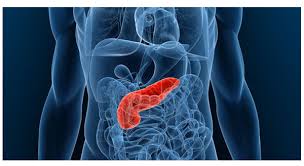- Home
- Editorial
- News
- Practice Guidelines
- Anesthesiology Guidelines
- Cancer Guidelines
- Cardiac Sciences Guidelines
- Critical Care Guidelines
- Dentistry Guidelines
- Dermatology Guidelines
- Diabetes and Endo Guidelines
- Diagnostics Guidelines
- ENT Guidelines
- Featured Practice Guidelines
- Gastroenterology Guidelines
- Geriatrics Guidelines
- Medicine Guidelines
- Nephrology Guidelines
- Neurosciences Guidelines
- Obs and Gynae Guidelines
- Ophthalmology Guidelines
- Orthopaedics Guidelines
- Paediatrics Guidelines
- Psychiatry Guidelines
- Pulmonology Guidelines
- Radiology Guidelines
- Surgery Guidelines
- Urology Guidelines
Early PET-CT shall reduce Pancreatic cancer surgery by 20% : NICE

NICE has released its first Guideline which covers diagnosing and managing pancreatic cancer in adults aged 18 and over.It recommends the use of a more accurate scan called PET-CT to diagnose and determine the stage of pancreatic cancer in patients. The scan will speed up diagnosis and more accurately determine the stage of pancreatic cancer in patients.It’s estimated by NICE, that the PET-CT scan will result in a 20% reduction in surgery to remove the cancer.
Increasing the use of this scan will limit the damaging side effects for patients and ensure those with inoperable cancer can get earlier access to other treatments such as chemotherapy.
Professor Mark Baker, director of the centre for guidelines at NICE, said: “The PET-CT scan could have a significant impact on the treatment of patients with pancreatic cancer. It will mean that the staging process is more effective so that patients stand a better chance of getting the right treatment, at the right time.”
Pancreatic cancer is the fifth leading cause of cancer death in the UK. There are more than 9,500 new cases diagnosed each year. Once diagnosed, life expectancy is on average 4-6 months.
Professor Chris Harrison, National Clinical Director for Cancer at NHS England, said: “It is important that patients with pancreatic cancer have an accurate assessment of whether the cancer has spread before undergoing major surgery. This guidance shows how modern diagnostic techniques can bring about more personalised cancer care, tailoring the treatment to the needs of the patient.”
This guidance also recommends regular checks for people who have 2 or more close relatives, such as siblings, children or parents with pancreatic cancer or Lynch syndrome due to their inherited higher risk of the disease.
Professor John Primrose, chair of the NICE guideline committee and Professor of Surgery at the University of Southampton, said: “Pancreatic cancer is a devastating disease. It is important that patients have the best possible standard of treatment available even if cure is not feasible. If we can better identify which patients will benefit from surgery and chemotherapy, we can improve the support provided to patients and families through their surgery or end of life care.”
NICE also recommends increased support for the psychological impact that the cancer can have on patients, including anxiety and depression.
Anna Jewell, Director of Operations at Pancreatic Cancer UK, said: “Today’s incredibly exciting news is set to transform care for people with pancreatic cancer. The progress of this kind cannot come soon enough for people with a disease which currently has unacceptable variations in care and support across the UK.”

Disclaimer: This site is primarily intended for healthcare professionals. Any content/information on this website does not replace the advice of medical and/or health professionals and should not be construed as medical/diagnostic advice/endorsement or prescription. Use of this site is subject to our terms of use, privacy policy, advertisement policy. © 2020 Minerva Medical Treatment Pvt Ltd